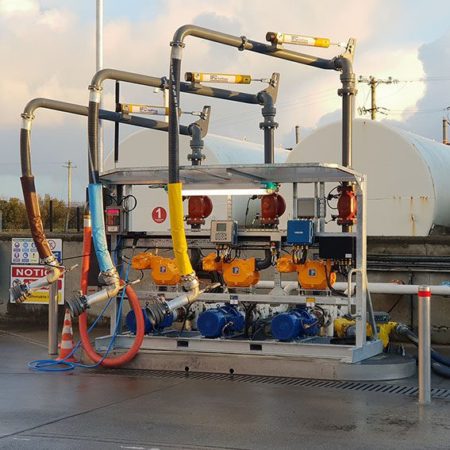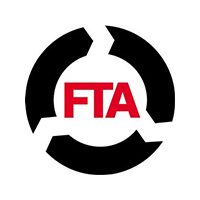
Liquid fuel distributors working hard to deliver essential heating oil & transport fuel to rural communities in the UK and Ireland
The UK and Ireland Fuel Distributors Association (UKIFDA) distributor members across both the UK and Ireland continue to work very hard in the face of unprecedented demand for liquid fuels. And the Trade Association is doing the same even though they are now working remotely and utilising technology to work effectively as a team.
UKIFDA Chief Executive Guy Pulham comments: “It is business as usual at UKIFDA member depots. Our members are working flat out delivering heating oil to households, red diesel to farming and construction industries and fuel to blue light services and due to this increased demand, we have been urging the public not to panic buy.
“Members have also put measures in place so business can continue whilst also adhering to Government COVID 19 guidelines including investing in new IT so admin and call centre staff can work from home through to enabling tanker drivers to be based at terminals to meet the increased demand. The situation has been changing daily this week and UKIFDA has been offering support to UKIFDA members across the UK and Ireland as well as liaising with the Government’s Energy Resilience Teams in Westminster and Scotland and the Irish Government.”
UKIFDA sought and has received from the Department For Transport (DFT) in the UK and the Road Safety Authority (RSA) in Ireland a relaxation of drivers hour’s regulations which should help Members meet this unprecedented demand although we recognise that there are limitations to the relaxation, especially around working time directives, which we will continue to push with the relevant bodies. There has also been relaxation on UK regulations regarding MOTs, PDP and ADRs in which UKIFDA have been involved.
In Ireland UKIFDA Irish Representative Nick Hayes has been liaising closely with the Health and Safety Authority (HAS) and they have agreed to an extension on ADR licences which expire over the next 6 months to the end of November. Nick Hayes has also been working alongside fellow trade association IPIA lobbying the Department of Social Protection and the Department of Transport.
UKIFDA is also offering advice to consumers on its website ukifda.org which its Members can link to. These include being patient, trusting your UKIFDA supplier, being honest about your fuel situation or if you are isolating due to the virus and, being cognisant of other’s needs, above yours, especially if there are vulnerable people in your local community.
Dawn Shakespeare, Membership & Events Manager, adds: “Many of our members operate the Cold Weather Priority Scheme for those over 75 and some Members are temporarily extending this scheme to offer priority delivery to those in the age bracket 70+ and where possible those who have to self-isolate due to COVID 19. We have advised consumers to check with their UKIFDA member what support they are providing.
Tony Brown, Technical Manager, has been key in many of the discussions around relaxation of rules around ADR, PDP and MOTs which have been communicated to Members through briefings alongside the briefings from Governments in both the UK and Ireland. His role also includes advising Members and our own staff on HSE matters.
“The wellbeing of our Members staff and customers remains our priority and our Members are putting in place reasonable and proportionate arrangements to protect their staff (both office based and delivery drivers) and customers. This includes following Public Health guidance. Specific arrangements will vary from distributor to distributor – so we are asking people to please check their UKIFDA supplier’s website or ask them when ordering by telephone – but they may include: –

Whilst the majority of the country goes into lockdown, the UK government has classed fuel and oil distribution as a key service that needs to continue.
With the importance of social distancing now playing a crucial role, fuel oil distributors who do have regular contact with some customers are taking measures to ensure that distribution can continue in the safest way possible.
Minimising contact
Following preventative guidance from the UK and Scottish Governments, along with the World Health Organisation and advice from industry bodies such as UKIFDA, in Scotland Gleaner has put steps in place to protect both employees and customers as much as possible.
These preventative measures include not handing over their hand-held devices for customer signatures upon delivery, but instead drivers will log the account holder name. Hand washing facilities within stores are also available, as well as disposable gloves being provided for fuel pump operations and contactless payments being promoted.
Gleaner has also requested that customers buy sensibly to make the stock in their stores last, with enough being available for everyone.
Operating behind closed doors
Berkshire-based Marsh Fuels announced last week that although their offices are closed to non-staff, they are still operating behind the scenes with drivers continuing to make deliveries, wearing their usual protective gear. The company has asked customers to only greet drivers from afar to adhere to social distancing advice and minimise business disruption.
A higher demand
Owner Carrie Marsh is urging customers not to panic buy, stating that deliveries will be made to existing customers as well as new customers, whose normal supplier may have closed the door on new orders. With oil in such high demand, Carrie says: “We prioritise our more senior customers that we know of in our village and anyone with specific challenges, such as a customer who has newly returned home from a hip operation or a new-born baby at the other end of the scale!”
Even in such trying times, Carrie remains positive:
“Our company has seen two world wars and got to this point, so I know our staff will, as ever, pull together and get us through this stage in history in the same way.”
Alleviating panic buys
Other fuel distributors are also deterring panic buyers, such as Star Multifuels in Wales which took to LinkedIn to reassure customers that they are still delivering oil as normal, and that customers should not worry about placing orders in a panic.
The company also announced that it has extended its opening hours enabling customers to order over a longer period, and has suggested that card payments should be made upon ordering to avoid disappointment.
With the landscape changing day by day, more business disruption is anticipated, but for many fuel oil distributors it is business as usual, maintaining their part in the supply chain whilst also going above and beyond the industry’s already stringent safety rules.

At the beginning of this year, we put together our annual prediction for oil prices and those who read it will remember that it was largely bearish in tone. Our thinking was that just as oil production was increasing, the global economy was showing sure signs of a slow-down. We also pointed out that OPEC’s surprisingly steadfast cohesion, was now under threat, with certain member states (along with Russia) increasingly fed-up with the continued production cut regime.
What we didn’t fully appreciate when we wrote the report was that these factors would be background noise, once the impact of Coronavirus (then it is early stages and pretty-well confined to China) started to take a grip. To put it mildly, the Coronavirus has hit oil (and stock) markets like a whirlwind and all at a rather inconvenient time for the global oil industry. We discussed the impact on demand last month, with consumption down by about 2-3m barrels per day (bpd) in February alone, but worse was soon to come when Saudi Arabia and Russia became embroiled in a spectacular supply side spat.
Relationships within OPEC have been increasingly discordant for several years now, but they reached breaking point at March’s OPEC meeting in Vienna. Saudi Arabia basically accused fellow OPEC members (and Russia) of playing a duplicitous game when it came to production cuts. The Saudis believe that only they have fully cut production (and thus pushed up prices), whilst their OPEC colleagues have simply paid lip-service to the idea and in fact have aimed to increase production, whilst “filling their boots” at the higher prices. Russia’s counter view was that not only had they been diligent in enforcing their own production cuts, but more significantly, further cuts would have little effect anyway in the face of mass demand drop-off caused by the Coronavirus.
Cue one of the most bad-tempered OPEC meetings in recent history as tempers rose and harmony vanished in a morass of name calling, finger pointing and general throwing of toys out of prams. As the meeting broke asunder, Saudi Arabia didn’t just confirm that the production cut regime was over, they went on to announce that the kingdom would be increasing their production by 45% (ie, from 9m bpd to 13m bpd). The result on oil markets was as electrifying as it was catastrophic. On the day of the announcement, oil prices fell by $8 per barrel and the following Monday, by a similar amount. These falls in price (see graphs) were the biggest single day drops since at least 1990 and (if we had the records) probably way before that.
So where next for oil prices? In the short-term, we can safely discount any recovery in consumer demand pushing prices back upwards quickly. Clearly, as long as Coronavirus has its grip on Government policy across the world, then lock-downs remain the order of the day, which in turn means consumption is severely constrained. At a macro level however, there could be support for oil prices from the large, strategic buyers, who are now looking at attractively low oil prices. The two biggest strategic buyers of oil in the world are the oil reserve companies of the USA and China respectively, both of whom are currently holding less stock than they are legislatively obliged to hold. Therefore, they need to boost stocks and what better time to do that than now, with prices much lower than at any point in the last 10 years?
However, even a major buying spree based on the above scenario will be less important to the market’s direction than the behaviour of the world’s major oil producing nations over the next few weeks. Saudi Arabia’s decision to increase production remains the key factor. Even if the markets have already “priced in” this excess volume (this was the reason for the huge price drops), when the extra oil actually starts to flow and the market literally becomes flooded with oil (tankage full to the brim, tankers full of oil and anchored outside ports with nowhere to discharge) it seems impossible to predict anything other than a continued bearish market.
One might wonder then, whether the Saudis are now heavily regretting opening this particular Pandora’s box? After all, the drop in oil prices has now gone way beyond simply punishing Russia and putting US producers out of business. It is now drastically hurting Saudi Arabia itself and remember, it was only in December that Saudi Aramco became the biggest IPO in history. It’s fair to say that recent private investors in the company will not be enjoying these low, low prices. So one possible outcome which will not be reported, might be for the Saudis to quietly walk away from their threat to increase production and simply keep things as they were. That won’t be enough to get prices rising again, but it would be the only thing that could stop prices falling much further.
Portland Fuel
www.portland-fuel.co.uk

With the country facing a critical shortage of hand sanitisers INEOS, Europe’s largest producer of the two key raw material needed for hospital grade hand sanitiser, is to build a UK factory, and one in Germany, within the next 10 days to produce one million bottles of sanitiser per month with product being free to hospitals.
Concentrating on meeting the needs of front line medical and care services, INEOS, intends to produce both standard and the increasingly popular ‘pocket bottle’ hand sanitisers and is already talking to retail outlets across Europe. Supplies to NHS hospitals will be free of charge for the period of the crisis with the public being able to purchase bottles through retailers.
INEOS takes its corporate and social responsibilities extremely seriously, its products are essential to the production of essential healthcare products from rubber gloves, to PVC saline drips, syringes, ventilators, medical tubing. Its products purify the public drinking water. It produces raw materials for soap, acetone for aspirin and paracetamol, and its phenol is being used in pharmaceutical analysis essential in procedures necessary to find a vaccine.
Sir Jim Ratcliffe, founder and chairman of INEOS said:
“It is becoming increasingly clear that hand to mouth infection is a significant cause of Coronavirus contagion. INEOS is a company with enormous resources and manufacturing skills. If we can find other ways to help in the coronavirus battle, we are absolutely committed to playing our part.”
For more information please go to our website: www.ineoshandgel.com
Having monitored the situation in relation to Covid-19 and following the UK Government’s and World Health Organisation’s recommendations in relation to holding public events, UKIFDA took the decision to move the event from 10 & 11 June to 18 & 19 August 2020 in Liverpool.

The Freight Transport Association has responded to the news that the introduction of Oxford’s Zero Emission Zone (ZEZ) is due to be postponed with Birmingham City Council and Leeds City Council also requesting postponements of their Clean Air Zone (CAZs).
“FTA supports the decision made by Oxford City Council and Oxfordshire County Council to postpone the introduction of the ZEZ, and we also support Birmingham City Council and Leeds City Council in their requests to government to have their CAZs postponed,” said Natalie Chapman, head of urban Policy at FTA comments:
“Delaying the introduction of these schemes will allow businesses operating within the logistics sector to focus their efforts on ensuring the public, supermarkets and other retailers all receive the essential items needed during this pandemic.
“We urge other cities with impending clean air schemes to follow suit; with logistics businesses facing unprecedented demand for food, hygiene products, medicines and other basic items, the right framework must be in place to support these workers through these extraordinary times and to keep the supply chain intact.”
“FTA fully and wholeheartedly supports the need to improve air quality,” added Ms Chapman.
“It is simply that these schemes pose a major change, and currently our industry cannot undertake the work and planning it needs to do in order to achieve smooth compliance or be certain it has the funds to make these changes. As well as the administrative difficulties logistics is experiencing, supplies of technology, equipment and trucks are already being disrupted and more effects are expected. This will further hinder efforts to comply with these schemes and service our cities efficiently.”

“We have the necessary expertise, experience and appropriate manufacturing equipment, so we would welcome the opportunity to help in any way we can,” said Signal’s MD, James Clements
The UK Government’s Department for Business, Energy & Industrial Strategy has issued a call to manufacturers seeking support in the supply of ventilators and ventilator components as part of the response to Coronavirus.
Despite a healthy order book for gas analysers, Signal Group has responded positively; formally expressing a willingness to help.
“As a developer and manufacturer of precision gas analysis equipment, we are accustomed with the technologies involved in the reliable, measured flow of contaminant-free gases,” says Signal’s MD James Clements.
“We have the necessary expertise, experience and appropriate manufacturing equipment, so we would welcome the opportunity to help in any way we can.”
The UK Government is also seeking organisations with skills in design/specification, rapid prototyping, product assembly and certification/regulation/testing, so Signal has also offered its services in this regard.
Speaking on Monday 23rd March 2020, James Clements said:
“We are waiting to hear if our offer of help is accepted. For the time being, we are carrying on with our normal work, with as many staff as possible home-working and only essential staff coming into the Camberley factory, whilst maintaining appropriate social distancing.”
Earlier this month Re-Gen Robotics lifted the Safety Technology Award at the 2020 Global Tank Storage Awards, in Rotterdam, for revolutionising safety in the tank terminal industry.
Relief
Last week’s budget announcement brought relief to agriculture, rail, fish farming and non-commercial heating with all being exempt from the abolishment of the red diesel subsidy.
Whilst this news was well-received by UKIFDA, CEO Guy Pulham was ‘disappointed that the red diesel fuel duty relief freeze was not extended to the construction industry especially as a large amount of infrastructure projects were announced in the budget.’
The completion of a multi-million pounds infrastructure upgrade programme at Inter Terminals’ Grays facility on the Thames has increased throughput capacity and enabled the receipt/dispatch of increased volumes of petrol/diesel at significantly faster rates than previously possible.











